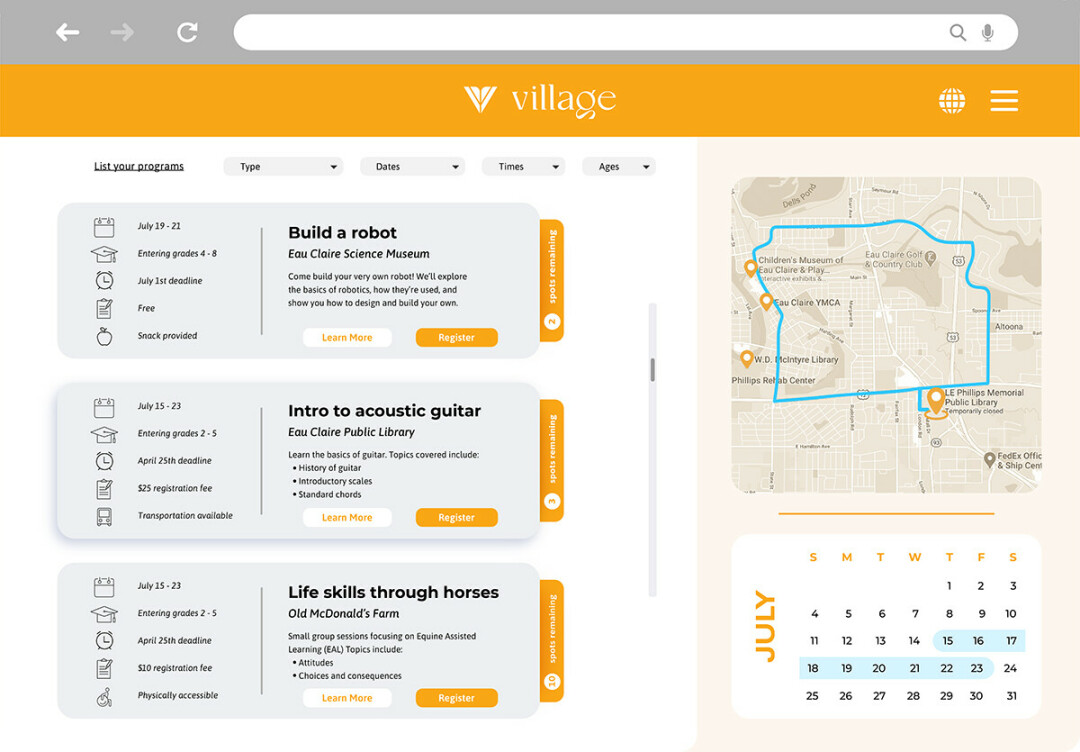
For Eau Claire Startup, Success Takes a Village
venture capital-backed firm aims to connect children and families with outside-of-school opportunities
Tom Giffey, photos by Andrea Paulseth

Noah Plewa knows better than many the lifelong value that out-of-school activities – from summer camps to sports teams – have on young learners.
The Eau Claire native followed a relatively unconventional educational path: Part of his youth was spent being homeschooled, and he attended seventh through 12th grades at Wildlands School, a project-based learning public charter school at Beaver Creek Reserve. With the help of opportunities offered throughout the community, he was always learning – even if he wasn’t always (or even usually) in a classroom.
At Minnesota’s Carleton College, he considered following father, Dr. John Plewa, into medicine, but instead he receiving a philosophy degree in 2019. He ended up working for a Twin Cities-based software company that served school districts and the like, an experience that led him to launch his own unique startup: VILLAGE.
“I think I knew I wanted to solve problems,” he says of his career’s beginnings. “I just was looking for the right problem to solve.”
”
I have a jaded view of a lot of companies started by young founders.
I think a lot of times the first thing they do is get an Instagram account and start just spewing stuff, and I wanted to wait until we had some progress.
NOAH PLEWA
CEO, VILLAGE
The problem he ultimately identified was the challenge of connecting providers of out-of-school activities with the families that want to access them in an easy-to-use, comprehensive way. These providers – who can include everyone from school districts and YMCAs to small nonprofits and music teachers – typically must create their own websites and registration systems, spending time and money doing this instead of providing their services. Any parent who’s tried to sign up a child for after-school activities knows this plethora of platforms can be aggravating to navigate. Furthermore, children from low-income families often can’t access these opportunities because they can’t afford the necessary fees. This is one of the big reasons that 40% of American kids don’t participate in any out-of-school programs, Plewa said.
This is where VILLAGE comes in to serve providers, families, “hubs” (typically school districts or other large child-serving organizations), and donors. “Every city in America has these four things,” Plewa said. “The issue is they’re not talking to each other. What we do is just sort of be the translator. We help them speak to each other in a way that then they can all pursue their interests.”
Ultimately, VILLAGE aims to be an Airbnb-style online service that seamlessly links a community’s providers and families all in one place. Plewa and his team are in the process of building out their services in Eau Claire, and eventually hope to scale them up to serve communities nationwide.

And this isn’t just an idealistic vision: VILLAGE has big money behind it as well as an innovative corporate structure. In addition to early money from a pair of angel investors, in November VILLAGE received a $475,000 infusion with the help of Winnow, a Wisconsin-based venture capital fund, as well as private investors in New York and Los Angeles.
As for its corporate structure, VILLAGE is a “hybrid social venture” made up of two entities – one for-profit, one nonprofit – that work together. (It’s a unique arrangement that has been built from the ground up with they help of New York attorney Allen Bromberger, an expert in the field.) The for-profit side allows access to investment that will allow VILLAGE to develop its software, while the nonprofit side allows VILLAGE to accept donations (from organizations, foundations, or individuals) to help lower-income families access programs. In fact, VILLAGE received a $25,000 grant earlier this year from Mayo Clinic Health System to build its capacity.
“When we get a dollar in a city, we can spend that dollar in that city just focused on getting kids onto the platform,” Plewa said.
Over the past year, VILLAGE has built a coast-to-coast team: Plewa, the CEO, and two others (including his mother, Trish Cummins, an entrepreneur and former Eau Claire school board member) are based in Eau Claire, while others work remotely from Minneapolis, Seattle, Los Angeles, and North Carolina. In the coming weeks, it will face its first public test: On Dec. 7, it was scheduled to begin accepting applications for a holiday program conducted by Power of Perception, a local mentoring group for Black and biracial kids. Other current providers who’ve signed on include the Pablo Center at the Confluence and I AM Elite Track & Field, and with more poised to join in the near future.
Thus far, VILLAGE has been relatively quiet, but that will soon change if it becomes the one-stop-shop for Eau Claire families that Plewa envisions.
“I have a jaded view of a lot of companies started by young founders,” he acknowledged. “I think a lot of times the first thing they do is get an Instagram account and start just spewing stuff, and I wanted to wait until we had some progress.”
Now that progress is underway, Plewa is excited to share VILLAGE with his hometown.
Learn more about VILLAGE at partners.village.com.